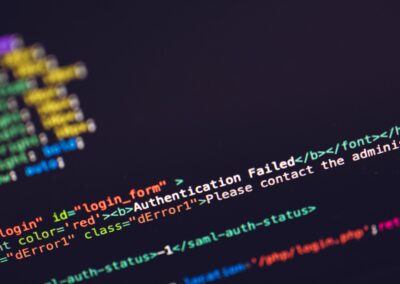Strategies for Safeguarding Digital Identities
Understanding the Threats to Digital Identities
Protecting digital identities from phishing and social engineering attacks is a critical concern for organizations operating in today’s digital landscape. In regions like Saudi Arabia and the UAE, where digital transformation is rapidly advancing, ensuring the security of digital identities is paramount for maintaining trust and protecting sensitive information. Phishing attacks typically involve fraudulent attempts to obtain sensitive data, such as usernames, passwords, and credit card details, by masquerading as trustworthy entities. Social engineering, on the other hand, exploits human psychology to trick individuals into revealing confidential information.
Phishing attacks are often delivered via email, social media, or messaging platforms, where attackers pose as legitimate institutions to deceive recipients into providing personal information. For business executives and mid-level managers in Riyadh and Dubai, understanding the various forms of phishing attacks, such as spear phishing, whaling, and clone phishing, is essential for developing effective defense strategies. Recognizing these threats and educating employees about them can significantly reduce the risk of successful attacks.
Social engineering attacks, including tactics like pretexting, baiting, and quid pro quo, manipulate individuals into compromising their digital identities. These attacks often rely on creating a sense of urgency or leveraging social trust to gain access to sensitive information. By being aware of these tactics, organizations can implement measures to safeguard against social engineering attempts, thereby protecting digital identities from unauthorized access.
Implementing Robust Security Measures
Implementing robust security measures is crucial for protecting digital identities from phishing and social engineering attacks. For organizations in Saudi Arabia and the UAE, adopting a multi-layered approach to security can provide comprehensive protection against these threats. One key measure is the use of multi-factor authentication (MFA), which requires users to verify their identities through multiple methods, such as a password and a one-time code sent to their mobile device. MFA significantly reduces the likelihood of unauthorized access, even if login credentials are compromised.
Another important measure is the implementation of advanced email security solutions that can detect and block phishing attempts before they reach the inbox. These solutions use machine learning algorithms to analyze email content and identify suspicious patterns, helping to prevent phishing attacks from being delivered to employees. For business leaders in Riyadh and Dubai, investing in these technologies can enhance the organization’s overall security posture and protect digital identities from phishing threats.
Additionally, organizations should conduct regular security audits and vulnerability assessments to identify and address potential weaknesses in their security infrastructure. These assessments can help organizations stay ahead of emerging threats and ensure that their security measures are effective. By taking a proactive approach to security, organizations can mitigate the risk of phishing and social engineering attacks, safeguarding their digital identities.
Educating Employees on Cybersecurity Best Practices
Educating employees on cybersecurity best practices is essential for creating a culture of security awareness within the organization. For businesses in Saudi Arabia and the UAE, providing regular training sessions on identifying and responding to phishing and social engineering attacks is crucial for protecting digital identities. Training programs should cover topics such as recognizing phishing emails, verifying the authenticity of requests for information, and safely handling sensitive data.
Interactive training methods, such as simulated phishing exercises, can be particularly effective in reinforcing key concepts and helping employees practice their response to potential attacks. These exercises can help employees recognize the signs of phishing attempts and develop the skills needed to avoid falling victim to social engineering tactics. For entrepreneurs and business leaders in Riyadh and Dubai, incorporating cybersecurity training into executive coaching and leadership development programs can ensure that all levels of the organization are equipped to handle cyber threats effectively.
In addition to formal training programs, organizations should encourage ongoing learning and awareness through internal communications, workshops, and discussions. Creating forums for employees to share their experiences and insights on cybersecurity can help reinforce the importance of security and promote a collaborative approach to addressing threats. By prioritizing cybersecurity education, organizations can strengthen their defenses against phishing and social engineering attacks, protecting digital identities from compromise.
Leveraging Advanced Technologies for Enhanced Protection
Utilizing Artificial Intelligence for Threat Detection
Utilizing artificial intelligence (AI) for threat detection can significantly enhance an organization’s ability to protect digital identities from phishing and social engineering attacks. AI-powered security solutions can analyze vast amounts of data in real-time, identifying patterns and anomalies that may indicate a potential attack. For businesses in Saudi Arabia and the UAE, adopting AI-driven security tools can provide a proactive defense against cyber threats.
AI algorithms can be used to monitor email traffic, social media interactions, and other communication channels for signs of phishing and social engineering attempts. By continuously learning from new data, these algorithms can adapt to evolving threats and improve their detection capabilities. For example, AI can identify suspicious email senders, unusual login activities, and other indicators of potential phishing attempts. By integrating AI into their security strategies, organizations can detect and respond to threats more effectively, protecting digital identities from compromise.
In addition to threat detection, AI can be used to automate incident response and remediation processes. When a potential threat is identified, AI-powered systems can automatically take actions to mitigate the risk, such as blocking malicious emails, alerting security teams, and initiating password resets. This automated approach can help organizations respond to threats more quickly and efficiently, minimizing the impact of phishing and social engineering attacks on digital identities.
Adopting Blockchain for Secure Identity Management
Adopting blockchain technology for secure identity management offers a promising solution for protecting digital identities from phishing and social engineering attacks. Blockchain’s decentralized and immutable nature ensures that digital identities are securely stored and cannot be tampered with. For organizations in Riyadh and Dubai, leveraging blockchain for identity management can enhance data security and provide a robust defense against unauthorized access.
Blockchain can be used to create decentralized identity (DID) systems, where individuals control their own identity data and share it selectively with trusted parties. This approach reduces the reliance on centralized databases, which are often targeted by cyber attackers. By using blockchain to manage digital identities, organizations can ensure that personal information is securely stored and accessible only to authorized entities. This decentralized model also enhances user privacy and control over their own data.
Furthermore, blockchain can provide a transparent and verifiable record of identity transactions, ensuring that any changes to digital identities are traceable and auditable. This transparency can help prevent identity fraud and enable organizations to detect and respond to suspicious activities more effectively. By integrating blockchain into their identity management systems, organizations can protect digital identities from phishing and social engineering attacks, ensuring the security and integrity of personal information.
Continuous Monitoring and Adaptation
Continuous monitoring and adaptation are essential for maintaining effective protection of digital identities from phishing and social engineering attacks. The cybersecurity landscape is constantly evolving, with new threats and attack techniques emerging regularly. For business leaders in Saudi Arabia and the UAE, staying informed about the latest developments in cybersecurity and adapting their strategies accordingly is crucial for ensuring long-term protection.
Organizations should implement continuous monitoring tools that provide real-time visibility into their security posture and detect potential threats as they arise. These tools can help organizations identify and address vulnerabilities promptly, ensuring that their security measures remain effective against emerging threats. Additionally, conducting regular security reviews and updating security policies and procedures can help organizations stay ahead of new attack vectors and adapt to changing threat landscapes.
Engaging with cybersecurity experts and participating in industry forums can provide valuable insights into best practices and emerging trends in cybersecurity. By staying informed and proactive, organizations can better anticipate potential threats and take appropriate actions to safeguard digital identities. In the dynamic business environments of Riyadh and Dubai, maintaining a continuous focus on cybersecurity is essential for protecting digital identities and ensuring the security of personal and organizational information.
Conclusion: Achieving Robust Protection for Digital Identities
Protecting digital identities from phishing and social engineering attacks requires a comprehensive approach that includes robust security measures, advanced technologies, and proactive education and awareness. For organizations in Saudi Arabia and the UAE, implementing multi-factor authentication, leveraging AI and blockchain, and promoting cybersecurity training are essential steps towards safeguarding digital identities.
By developing a culture of security awareness, utilizing advanced threat detection tools, and continuously monitoring and adapting to emerging threats, businesses can effectively protect digital identities from compromise. Engaging with stakeholders and maintaining open communication on cybersecurity issues further enhances transparency and trust. Through these efforts, organizations can achieve success in the digital age while upholding the highest standards of data privacy and security.
—
#ProtectingDigitalIdentitiesFromPhishing, #SocialEngineering, #DataSecurity, #Cybersecurity, #ArtificialIntelligence, #Blockchain, #GenerativeAI, #ModernTechnology, #ExecutiveCoaching, #BusinessSuccess, #LeadershipSkills, #ProjectManagement, #SaudiArabia, #UAE, #Riyadh, #Dubai























